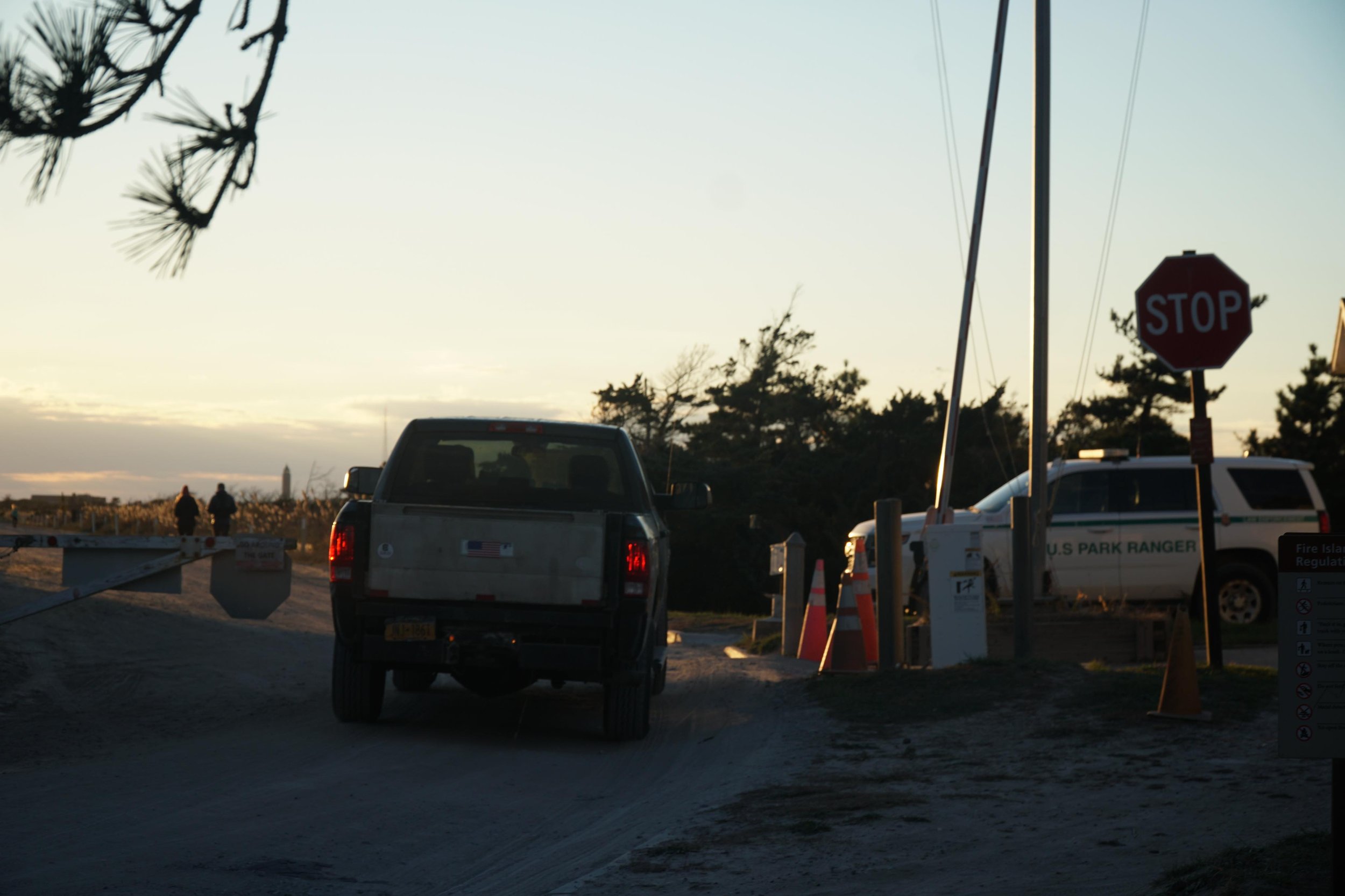
Pickup truck waiting at the Fire Island National Seashore western checkpoint gate, taken by Skylar Epstein on the evening of Saturday, November 11, 2023.
Fire Island National Seashore (FINS) officials are seeking public input on proposed changes to the seashore’s Off-Road Vehicle (ORV) Management Program. The National Park Service (NPS) has launched a 36-day “public scoping period” under the National Environmental Policy Act (NEPA) to gather public opinions about the future of Fire Island’s driving policy.
The NPS is collecting public input via a public comment period, a public Zoom meeting, and an in-person public meeting. The public Zoom meeting was held on the evening of Tuesday, Nov. 14, and the in-person meeting was held at the Patchogue Ferry Terminal the next evening. The public comment period was launched on Monday, Oct. 30, and closes on Monday, Dec. 4 (see embedded link to submit a comment).
As anyone who’s ever visited Fire Island knows, driving is heavily restricted on our island and has been at least since the establishment of the national seashore in 1964. The driving restrictions are baked into Fire Island’s character and are relatively unique within the U.S. Driving on Fire Island is regulated by the NPS through seasonal closures and an often-polarizing permit system. Fire Island’s ORV regulation regime has not been updated since 1987. Fire Islanders are split on how and if these regulations need to be changed and this divide was reflected at the online and in-person public meetings.
Both meetings opened with a presentation by NPS personnel about the three proposed plans for the future of the ORV Management Program and were followed by a Q&A session. The three plans presented in these meetings are also explained in the Fire Island ORV Management Public Scoping Newsletter, which is the document the NPS is currently seeking comments on. First of all, it is worth noting that none of these plans are set in stone and that current public input can be incorporated into them as FINS moves through the NEPA process. The public also will get additional opportunities to comment on the policy change during the environmental assessment public review planned for late spring 2024. However, the three plans as currently presented make the following proposals.
Alternative A: No Action ~ This alternative would retain existing driving regulations and scheduling including the permit cap of 145 for year-round residents and the cap of 80 for construction/business permits.
Alternative B: End “Shoulder Seasons” ~ This proposed action would raise the number of year-round resident driving permits to 200 and raise the permit cap for construction/business permits to 145. Alternative B also eliminates the “partial driving season” (also known as the “shoulder seasons) and allows year-round resident permit holders to drive full-time until Suffolk County public schools close in June allowing them to start again the day after Labor Day in September. Driving also would still be restricted between Saturday 12 a.m. through Monday 11:59 p.m. on Memorial Day weekend.
Currently, full-time driving is allowed until the first Saturday in May and does not resume until the Tuesday after Columbus Day with driving being restricted to certain times and/or weekdays during the Spring and Fall shoulder seasons.
Alternative C: Lift Permit Caps ~ This alternative action would eliminate the caps for year-round resident and construction/business permits allowing all qualified applicants to secure permits. Alternative C also tweaks the details of the seasonal driving schedule but the “partial driving season” as a whole is preserved so the changes are much less dramatic than under Alternative B.
Full summer driving privileges are set to remain restricted to just official and emergency vehicles under all three plans with public utilities and essential services also getting some degree of summer driving access as well. Essential services have peak summer driving privileges on weekday nights from 6 p.m. to 9 a.m. (except for federal holidays) under all three plans.
Public utilities have that same arrangement under Alternative A and 24-hour summer access “for demonstrated need” under Alternatives B and C. Alternatives B and C would also both end the permit cap for utilities and essential services setting them up as two different permit categories. They are a combined category with 30 available permits, each of which is eligible for a fleet of vehicles, under current regulations.
Alternatives B and C would also set up temporary permits as a new category formalizing the current practice of allowing emergency trips on a case-by-case basis as determined by the superintendent, the current practice of issuing temporary ice-over permits also would be eliminated. Other changes including an end to the annual cap of 5,000 recreational one-way car trips entering the park through its east gate for hunting and sport fishing were included in the two plans. FINS officials would retain the ability to close the beach to driving to protect visitor safety and park resources, most notably breeding piping plovers and their chicks, under all three plans.
Reactions to the presented plans at the two recent public meetings and in general have been mixed. Approximately 144 people attended the public Zoom meeting, according to NPS staff. Questions on topics including environmental impacts, safety, the eligibility of different business types for permits, permit enforcement, and the possibility of winter access permits for seasonal homeowners were addressed.
Brendan Newell, resource manager for FINS, said during the meeting that if FINS pursues a plan increasing the number of permits: “The impact should be minimal as it is now.” Newell added this will be the case as long as drivers follow the rules and avoid driving too close to the dune, further stating that “those who do not follow the rules should have their permits revoked.”
Newell and other officials present on the call also emphasized that FINS would monitor the situation and make any adjustments necessary to protect park resources. Officials also emphasized that the plans being presented are preliminary and that members of the public should reach out with their input on matters of safety, permit eligibility, permit enforcement, and other concerns.
Alternative Plans B and C both propose cutting the number of seasonal homeowner permits from 100 to 50, though fewer than 40 are currently in use. According to the ORV Management Public Scoping Newsletter description of those two plans, “no new part-time resident permits would be issued once the existing permits are surrendered to allow for non-essential access to be phased out over time.”
None of the proposed alternatives explore the idea of expanding seasonal homeowner permits or other accommodations like vehicular access two days a year to aid in opening and closing seasonal homes.
“We did consider it but no, we did not move forward with authorizing it,” Newell explained as he responded to a question raised by one seasonal homeowner on the subject. “We are looking to limit driving to only that essential access that can’t happen otherwise by waterborne transportation.”
In the context of the public scoping period and the reexamination of FINS ORV Management policy, Superintendent Alexcy Romero is presently in a legal situation standing accused of mishandling of Fire Island driving policy enforcement.
Sam Wood, a year-round Kismet resident, fireman, and prominent local contractor/business leader, has filed a lawsuit against Romero and Secretary of the Interior Deb Haaland alleging that Romero illegally targeted him and his company for political retaliation.
Wood claims he was targeted with driving tickets for donating money to a ranger who had been fired, allegedly for refusing a verbal directive from Romero to not enforce anti-nudity laws in Cherry Grove and the Fire Island Pines. Wood said he was the largest donor to the ranger’s defense fund and states that he consequently received three frivolous driving tickets within three months of making his donation. Two of these tickets were later thrown out but they were still used as justification for suspending his business driving permit forcing Wood’s company to conduct Kismet’s trash pickup and removal via wagon instead of truck for the month of March 2022.
When asked for his opinion about the proposed changes to Fire Island driving policy Wood said that he mainly supports the “status quo” and that “the most updated proposal has more problems than solutions.” He also said that the NPS was “poking the bear” by attempting to change policy that had worked for decades. Wood added that he opposed substantially raising or abolishing the caps on year-round resident and contractor driving permits though he also said he could support smaller increases. On the other hand, Wood also simultaneously criticized aspects of current policy including what he sees as enforcement failures and the hardships he says it creates for young people trying to get year-round driving permits for the first time.
The lawsuit has been covered by prominent regional and national media outlets including Newsday and the New York Post.
“I cannot discuss the case. I am working with our solicitor’s office and the (United States Attorney’s Office) on this dispute,” replied Romero when approached for comment on the matter via email by Fire Island News.
The lawsuit continues to play out in the background as Romero oversees the effort to update the Fire Island driving policy he is presently accused of weaponizing.
All interested parties are entitled and encouraged to submit their comments to make their thoughts and preferences about the policy known. The public has until 11:59 p.m. Mountain Time on Monday, Dec. 4, 2023, to submit their comments and can do so digitally by clicking here. FINS also is accepting written comments submitted in person to the park’s headquarters in Patchogue, or by mail to: Off Road Vehicle Management Plan Superintendent Alexcy Romero, Fire Island National Seashore, 120 Laurel Street, Patchogue, NY 11772
More information about the proposed policy changes can be found on the Frequently Asked Questions page on the FINS website and you can read more details about the proposed changes by looking at the plans directly here.
Editor’s Note: Reporter Skylar Epstein is the son of Elliott Epstein, a Kismet Fire Department member; a vocal public proponent of seasonal homeowner access to Fire Island; and the publisher of kismetfiaccess.com, a website that advocates for that side of the Fire Island driving permit and access debate.































